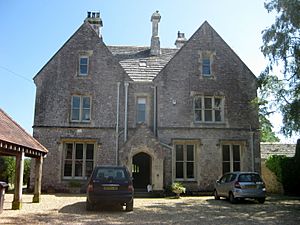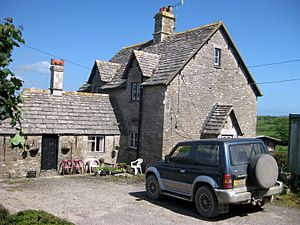Bucknowle Farm facts for kids
Bucknowle Farm is a special place in Dorset, England. It's not just a farm today, but also the exciting site of an ancient Romano-British settlement and a Roman villa. This means people lived and farmed here a very long time ago, when the Romans were in Britain!
The farm is located near Church Knowle and Corfe Castle village. It's also close to Wareham and Swanage, right in the middle of the beautiful Isle of Purbeck.
Discovering Ancient Bucknowle
Many ancient Roman-British sites have been found on the Isle of Purbeck. But the Roman villa at Bucknowle Farm is extra special. It was the first large Roman villa discovered south of the Purbeck Hills.
Archaeologists, who are like history detectives, worked at Bucknowle Farm for many years. They dug up the site between 1976 and 1991.
How it Was Found
The first clues about this ancient site appeared in 1975. People found small pieces of old pottery in a field. This was a big hint that something important was hidden underground!
The digging then began and continued until 1991. The archaeologists found many buildings that were once homes and farm buildings. These structures showed how people lived and worked during Roman times.
Layers of History
Even more amazing, beneath the Roman buildings, the archaeologists found older remains. They discovered signs of people living there even earlier, during the Iron Age. This was before the Romans arrived in Britain! It also showed early Roman Age homes. This means Bucknowle Farm has layers of history, with different groups of people living there over thousands of years.
Bucknowle Farm Today
Today, Bucknowle Farm is still a working farm. It also has a camping site where people can stay. It's a great place to visit and imagine what life was like for the ancient people who lived there.
 | Lonnie Johnson |
 | Granville Woods |
 | Lewis Howard Latimer |
 | James West |



